The Capnography Equipment Market is estimated to be valued at USD 396.8 million in 2025 and is projected to reach USD 610.3 million by 2035, registering a compound annual growth rate (CAGR) of 4.4% over the forecast period.
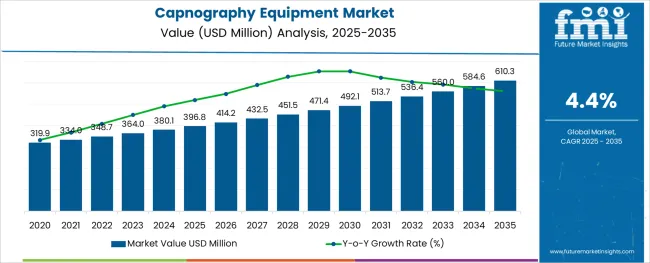
The capnography equipment market is experiencing significant momentum due to heightened focus on respiratory monitoring, expansion in critical care settings, and clinical adoption driven by post-operative and emergency care needs. Regulatory emphasis on early detection of ventilation abnormalities, especially in patients under anesthesia or sedation, has elevated the importance of end-tidal CO₂ monitoring.
Technological improvements in sensor accuracy, miniaturization, and wireless integration have contributed to broader deployment in both hospital and pre-hospital environments. Furthermore, the rising incidence of chronic respiratory disorders and increasing demand for real-time monitoring during resuscitation procedures are strengthening market penetration.
Continued expansion of ambulatory surgical centers, together with growing awareness of the clinical utility of capnography beyond the operating room, is expected to support sustained market growth in the coming years.
The market is segmented by Product Type, Technology Type, Application, and End User and region. By Product Type, the market is divided into Capnometers and Capnography Accessories & Disposables. In terms of Technology Type, the market is classified into Mainstream Capnography, Sidestream Capnography, and Microstream Capnography.
Based on Application, the market is segmented into Cardiac Care, Trauma and Emergency Care, Respiratory Monitoring, and Other Applications. By End User, the market is divided into Hospitals, Ambulatory Surgery Centers and Home Care, and Other End Users.
Regionally, the market is classified into North America, Latin America, Western Europe, Eastern Europe, Balkan & Baltic Countries, Russia & Belarus, Central Asia, East Asia, South Asia & Pacific, and the Middle East & Africa.
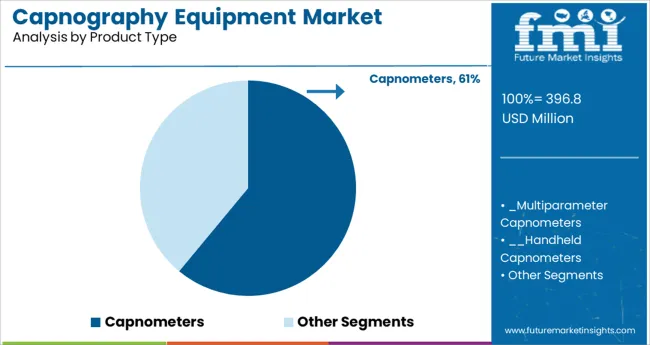
Capnometers are projected to account for 61.0% of total revenue in the capnography equipment market by 2025, making this product type the leading contributor. The segment’s dominance is being driven by increased usage across intensive care units, emergency departments, and ambulatory settings where real-time respiratory status is critical.
These devices offer reliable waveform analysis and CO₂ value measurements, which aid clinicians in ventilator adjustments, intubation verification, and cardiopulmonary monitoring. Their ease of integration with existing patient monitoring systems, along with enhanced battery life and portability, has contributed to their widespread adoption.
The capability of capnometers to provide immediate feedback during high-risk interventions further reinforces their relevance across a broad spectrum of clinical applications.
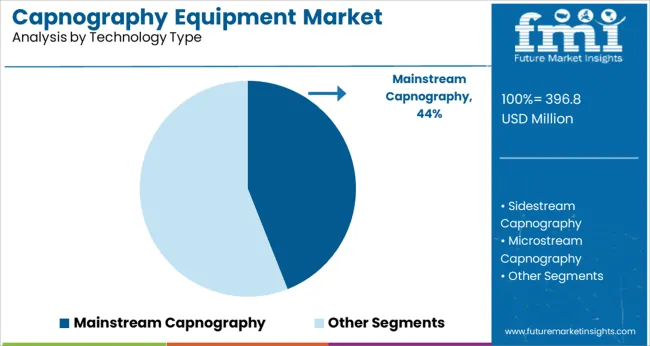
Mainstream capnography technology is expected to contribute 44.0% of the market share in 2025, positioning it as the dominant modality among capnography technologies. This segment's growth is attributed to its ability to deliver real-time and highly accurate CO₂ readings without delay, making it ideal for intubated patients.
Its direct sensor-to-airway connection minimizes data lag and supports reliable waveform generation, which is essential in surgical and intensive care settings. The absence of sampling lines reduces maintenance complexity and risk of blockages, enhancing reliability during prolonged monitoring.
Advancements in sensor durability and compatibility with both pediatric and adult patients have further encouraged clinical adoption. As more facilities prioritize high-resolution respiratory data and equipment standardization, mainstream technology continues to be favored for its precision and clinical consistency.
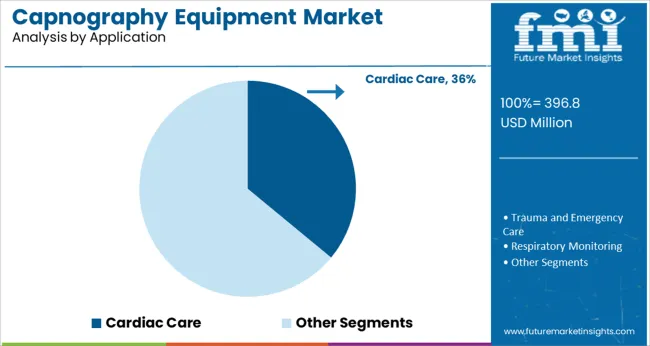
The cardiac care segment is projected to hold 36.0% of the total market revenue in 2025, establishing it as the leading application area for capnography equipment. Growth in this segment is being fueled by the integration of capnography in advanced cardiac life support (ACLS) protocols, where continuous monitoring of end-tidal CO₂ is critical for assessing CPR effectiveness and return of spontaneous circulation (ROSC).
Capnography has become a key tool in cardiac arrest management, post-resuscitation monitoring, and perioperative care of patients with cardiovascular comorbidities. Its non-invasive nature, coupled with its diagnostic and prognostic value, is encouraging widespread adoption across cardiology departments and emergency settings.
Increased training and protocol standardization have also contributed to the growing reliance on capnography in cardiac interventions.
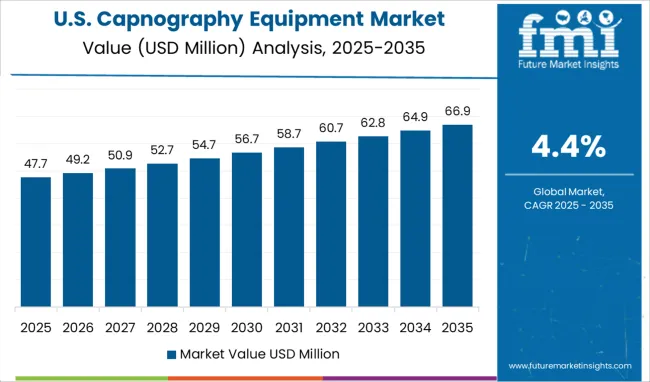
According to a 2024 report by the Office of Disease Prevention and Health Promotion, more than 25 million people in the USA are suffering from asthma. In addition to this, the rise in the number of surgical procedures and the popularity of capnography devices among the USA and Canada's physicians and healthcare professionals rendered North America the most significant contributor to the global capnography equipment market among all broad geographical regions.
Strategic initiatives by key players have also fueled market growth. For instance, in April 2024, Masimo announced that Radius PCG™, a portable real-time capnograph with wireless Bluetooth® connectivity, had received FDA 510(k) clearance.
Radius PCG connects with the Root®Patient Monitoring and Connectivity Platform to provide seamless, tetherless mainstream capnography for patients of all ages.
Radius PCG joins the growing family of tetherless Masimo technologies that includes Radius PPG™, which offers Masimo SET®Measure-through Motion and Low Perfusion pulse oximetry, and Radius Tº™, which provides continuous temperature measurements.
Radius PCG requires no routine calibration, with accurate end-tidal carbon dioxide (EtCO2) and respiration rate measurements and continuous EtCO2 waveforms displayed within 15 seconds-all in a small, portable package that can fit in the palm of a hand.
Manufacturers are working hard for research and development of innovative offerings to serve a large customer base and that will allow the capnography equipment market to grow.
Hence, manufacturers are adopting strategies such as mergers & acquisitions to expand their global footprint and add disruptive packaging advancements to their product portfolio.
A number of international market participants are entering into acquisitions and mergers and implementing new technology to increase commercial capacity to gain a major revenue share.
For instance, In December 2024, ZOLL Medical Corporation (ZOLL), an Asahi Kasei company, closed its acquisition of Itamar Medical Ltd. (Itamar Medical), an Israeli medical device manufacturer. Itamar Medical will operate as a business division within ZOLL.
Clinical benefits of capnography equipment over traditional pulse oximetry and the development of portable capnography monitors or POC is predicted to be the major drivers of the global capnography equipment market during the forecast years.
The global prevalence of respiratory disorders and diseases related to respiratory systems in the human body requires a continuous supply of external breathing aids with constant monitoring.
For such purposes, monitoring of the exhaled level of carbon dioxide is provided by capnography monitoring devices, making it an integral part of emergency medical services.
With the rise in respiratory diseases and ailments, the global market has been experiencing an increased demand for response capnography monitors.
A growing number of healthcare facilities in emerging economies is expected to further fuel the demand for pulse oximeters with capnography, positively stimulating the capnography equipment market in the region.
Due to ease of handling and quick availability during the deployment of ventilators or oxygen cylinders in the services provided at homecare setups, portable or POC capnography devices have emerged as the popular choice for various end users of the global capnography equipment market.
What are the Recent Growth Opportunities for the Global Capnography Equipment Market?
Advancements in patient monitoring and a higher rate of respiratory diseases such as pulmonary asthma embolism and chronic obstructive pulmonary diseases (COPD) are anticipated to create more opportunities for the growing use of patient monitor with ETCO2.
The detailed information on respiratory patterns and carbon dioxide concentration provided by such types of capnography monitors is the specialty for which such devices are getting popularity in the healthcare sectors.
What are Some of the Major Challenges faced by the Global Capnography Equipment Market Players in Different Regions?
Stringent regulations and ambiguous guidelines in different parts of the world have some restraining effects on the growth of the capnography medical devices market. The long process of testing and approval for the newly developed technologies is also another reason for the limited growth of the global market.
Variation in standards used in different regions for measuring various units obtained during the use of capnography instruments is the major challenge faced by capnography equipment manufacturers.
What are the Various Limitations in the Adoption of Capnography Equipment faced by its Global Market?
In developing economies, healthcare professionals face the unavailability of sufficient resources to supply the oxygen demand by the patients.
This major constraint has resulted in less awareness about the capnography monitoring equipment used during the process and less growth in these regions.
Necessary upgrading of previously followed medical procedures is expected to stimulate the adoption of patient monitors with capnography. For instance, the American Society of Anesthesiologists (ASA) stated reported in October 2010 for the continual observation of qualitative clinical signs of exhaled carbon dioxide by the patient under the influence of anesthesia.
This change in guidelines has helped in the wider adoption of response capnography monitors by healthcare professionals in the hospitals of the USA.
Despite the essentiality of capnography monitors for the proper running of capnography equipment, capnography accessories were the major products contributing to the larger share of the global market revenue.
The mainstream capnography segment is the most popular technology of the monitoring devices due to its easy use in monitoring breathing in intubated patients. This segment accounted for more than two-thirds of the global capnography equipment market in 2024 and 2024.
Sidestream capnography monitor and micro stream capnography technologies also used in capnography equipment were not as popular as per reports of the previous decade's market analysis reports.
Traditionally capnography equipment is majorly used during surgical procedures for cardiac and respiratory ailments. Until 2024 Cardiac surgeries segment accounted for 40% of the capnography instrument applications.
This segment is expected to contribute significantly to the global capnography devices market in the forthcoming years. The number of cardiac and cardiopulmonary surgeries found around the world has increased significantly, further driving the requirement for portable capnography monitors in the coming days.
With rising outdoor activities, there have also been rising cases of trauma & emergency care in the local hospitals of almost every region.
As various types of capnography monitors are used only for measuring the carbon dioxide pressure in respiratory gases mostly available in hospital setups, this segment is the largest end-user of the global market.
In 2024, the hospital segment accounted for 82.3% of the market share alone for a patient monitor system.
This segment is projected to reach a valuation of more than USD 610.3 Million by the end of the year 2035. Rising incidents of chronic respiratory diseases will be the primary reason for its 4.5% CAGR growth during the forecast period.
The other segment of ambulatory surgery centers is gaining popularity these days and promises some better opportunities for the global capnography equipment market in the near future. Personal use of pulse oximeters with capnography devices by individuals has introduced home care as a new emerging end-user for the global market.
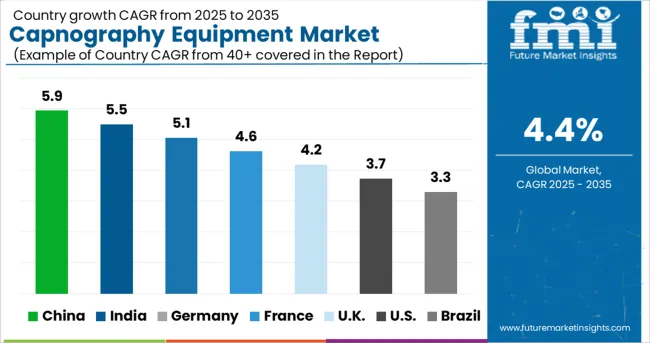
The rise in the number of surgical procedures and the popularity of capnography devices among the USA and Canada's physicians and healthcare professionals rendered North America the most significant contributor to the global capnography equipment market among all broad geographical regions.
By 2024 this region accounted for more than 50 percent of the revenue generated by the global market and is poised to continue its leading position during the forecast period.
Europe follows North America in adopting portable capnography devices by the healthcare professionals providing medical and personal doctors services. European countries together accounted for one-quarter of the global capnography monitoring equipment market's total revenue.
Contrastingly, the Asia Pacific region holds the most significant potential for growth in the capnography monitors for sale during the forecast period. Particularly Japan and China in the Asia Pacific region will record the highest growth in rate during the forecast years.
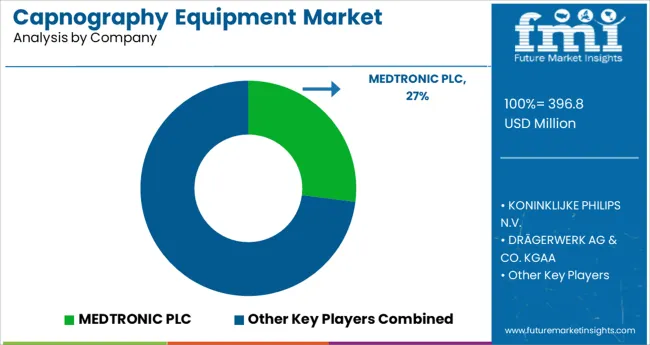
Some of the key market players critical players in the capnography equipment market covered by the market analysis report are Koninklijke Philips N.V., Drägerwerk AG & Co.
KGAA., Nihon Kohden Corporation, Zoll Medical (Asahi Kasei Corporation), Edan Instruments, Inc., Hamilton Medical, Masimo Corporation, Monday DS USA, Inc., Nonna Medical, Inc., Schiller, Smiths Medical, Advantech, and BPL Medical Technologies.
Besides manufacturing and selling portable capnography monitors, major players in the market focus on providing customer solutions for better management and patient safety.
Such expansion in services provided by capnography equipment manufacturers has emerged to be the primary strategy adopted to remain competitive in today’s world.
Research & development activities also carried out by the investment of such players are also driving the demand for their products.
Some of the Recent Developments in the Capnography Equipment Market
The global capnography equipment market is estimated to be valued at USD 396.8 million in 2025.
It is projected to reach USD 610.3 million by 2035.
The market is expected to grow at a 4.4% CAGR between 2025 and 2035.
The key product types are capnometers, _multiparameter capnometers, __handheld capnometers, __conventional capnometers, _standalone capnometers, __handheld capnometers, __conventional capnometers and capnography accessories & disposables.
mainstream capnography segment is expected to dominate with a 44.0% industry share in 2025.






Full Research Suite comprises of:
Market outlook & trends analysis
Interviews & case studies
Strategic recommendations
Vendor profiles & capabilities analysis
5-year forecasts
8 regions and 60+ country-level data splits
Market segment data splits
12 months of continuous data updates
DELIVERED AS:
PDF EXCEL ONLINE
Equipment Management Software Market Size and Share Forecast Outlook 2025 to 2035
Equipment cases market Size and Share Forecast Outlook 2025 to 2035
Farm Equipment Market Forecast and Outlook 2025 to 2035
Golf Equipment Market Size and Share Forecast Outlook 2025 to 2035
Port Equipment Market Size and Share Forecast Outlook 2025 to 2035
Pouch Equipment Market Growth – Demand, Trends & Outlook 2025 to 2035
Garage Equipment Market Forecast and Outlook 2025 to 2035
Mining Equipment Industry Analysis in Latin America Size and Share Forecast Outlook 2025 to 2035
Subsea Equipment Market Size and Share Forecast Outlook 2025 to 2035
Pavers Equipment Market Size and Share Forecast Outlook 2025 to 2035
Tennis Equipment Market Analysis - Size, Share, and Forecast Outlook 2025 to 2035
Galley Equipment Market Analysis and Forecast by Fit, Application, and Region through 2035
Sorting Equipment Market Size and Share Forecast Outlook 2025 to 2035
General Equipment Rental Services Market Size and Share Forecast Outlook 2025 to 2035
Bagging Equipment Market Size and Share Forecast Outlook 2025 to 2035
RF Test Equipment Market Size and Share Forecast Outlook 2025 to 2035
Medical Equipment Covers Market Size and Share Forecast Outlook 2025 to 2035
Telecom Equipment Market Size and Share Forecast Outlook 2025 to 2035
Welding Equipment And Consumables Market Size and Share Forecast Outlook 2025 to 2035
Hunting Equipment and Accessory Market Analysis - Size, Share, and Forecast Outlook 2025 to 2035

Thank you!
You will receive an email from our Business Development Manager. Please be sure to check your SPAM/JUNK folder too.
Chat With
MaRIA